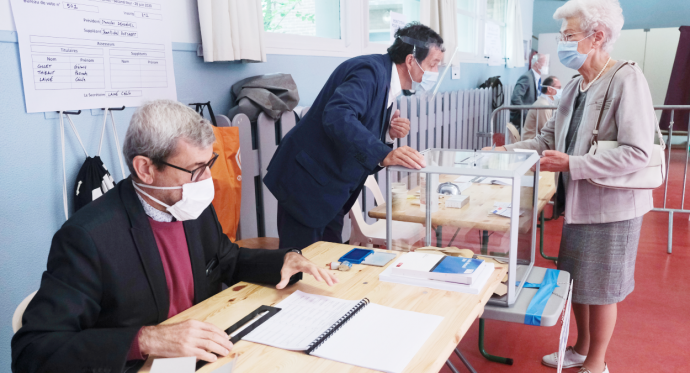Laurent Bach, Arthur Guillouzouic and Clément Malgouyres*
- This article was originally published in the May 2021 edition of the 5 papers…in 5 minutes.

The successive waves of the Covid-19 pandemic have forced most of the planet to stop any non-essential activity involving large groups of people until disease transmission is eventually controlled. Whether one should consider elections an essential activity in this context has become a matter of intense debates leading to dramatically different decisions across the globe. Some governments have postponed elections (local elections in Austria, Italy & UK, Ohio primaries), some have switched to mail-in voting (Poland, Alaska primaries), and others have decided to hold the elections as planned with further sanitary precautions (Israel, South Korea, Wisconsin primaries). The empirical evidence to guide public policy is very scarce.
In a recent paper, Laurent Bach, Arthur Guillouzouic and Clément Malgouyres seek to bridge this gap: they measure the impact of holding the first round of French town hall elections on the mortality of politicians running for office and obtain results for the general population as well. These elections provide an unusual setting as they were held at the peak of the epidemic in France — on Sunday the 15th of March 2020 —, one day after the nationwide closure of non-essential retail businesses was ordered and two days before a shelter-at-home order. Their analysis is based on individual death records from the French institute of statistics (Insee) matched with a public registry of candidates in town hall elections. The resulting dataset enables them to track the mortality rates of male candidates in the 2014 and 2020 municipal elections depending on the degree of participation into the 2020 election. In 2020, 160,000 candidates were men aged between 60 and 79 years old, representing 2.6 % of their category in the general population.
Their results are as follows. First, at the city-level, they compare the mortality of candidates in cities where two candidate lists compete with the mortality of candidates in cities where there is only one candidate list. The number of competing candidate lists is a strong determinant of turnout. Yet, the authors do not find any difference in mortality among candidates between the two types of cities. The lack of effect of electoral competition on mortality holds not only in the pool of candidates but also among city residents in general. Second, they investigate the mortality patterns of the people who were candidates in the previous municipal elections, held in 2014. They find that, among them, those who decided to run again in 2020 were not more likely to die from March to April 2020. Using a regression discontinuity design, the authors observe that candidates in 2014 are far more likely to participate again in 2020 if their candidate list had won the election in 2014. However, they do not detect any significant effect of winning the election in 2014 on mortality in March-April 2020. This confirms, using an entirely different identification strategy, that intense participation in the 2020 elections is not associated with higher mortality risk.
Overall, while the sanitary situation evolves constantly, the results are reassuring as to governments’ ability to hold elections during the ongoing pandemic. These results do not, of course, fully exhaust the debate on whether and how elections should be held during the pandemics. The elections the authors have analyzed may have spared the candidates in part because voters strategically did not turn out. This lack of voter participation is concerning as it reduces the legitimacy of voting results. Accordingly, a better understanding of turnout decisions in pandemic times and their long-term consequences are an interesting avenue for further research.
………………..
References
Original title of the article: Does Holding Elections during a Covid-19 Pandemic Put the Lives of Politicians at Risk?
Published in: Journal of Health Economics Volume 78, July 2021
Available at: https://www.sciencedirect.com/science/article/pii/S0167629621000473
Credits (picture): Alexandros Michailidis – Shutterstock
* PSE Member
